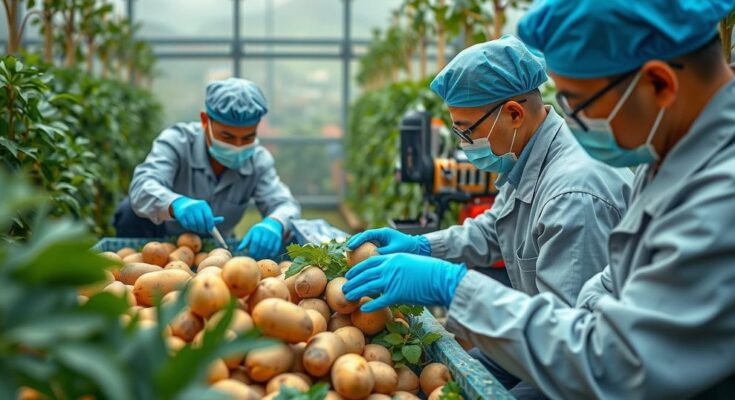Chinese scientists in Beijing are urgently working to cultivate climate-resistant potato varieties to combat the adverse effects of climate change, which threaten the yield and size of potatoes. Their recent research reveals the significant impact of higher temperatures on potato production, prompting the need for adaptive strategies to ensure food security in the face of global warming.
Chinese scientists are urgently developing climate-resilient potato varieties in response to the threat posed by climate change on food security. In a research facility near Beijing, molecular biologist Li Jieping and his team recently harvested a selection of diminutive potatoes, some as small as a quail’s egg, which were cultivated under simulated higher temperature conditions projected for the end of this century. The findings indicate that although these potatoes mature faster by ten days, they are significantly smaller and yield less than half of typical Chinese potatoes, which usually weigh at least twice as much as a baseball.
As the leading producer of potatoes globally, China is particularly vulnerable to the adverse effects of rising temperatures, as the crop’s yields are threatened by increasing heat, drought, and flooding—consequences of climate change that are already being experienced by farmers. The urgent demand for new varieties that can withstand these challenges has prompted Li’s team to focus on China’s most commonly grown potatoes in a comprehensive three-year study. Published in the journal Climate Smart Agriculture, their research highlights the need for adaptive strategies as global warming poses a growing risk to food supplies.
With predictions suggesting an alarming temperature increase of as much as 3.1 degrees Celsius by the end of the century, farmers are being advised to alter their planting schedules or even move cultivation to higher altitudes to mitigate the effects of heat. Collaboratively conducted with the Chinese government, this research aims to support farmers in adapting to the impending climate challenges through the development of more resilient potato strains. In greenhouse settings, researchers are actively cross-pollinating heat-resistant varieties to ensure future sustainability in this vital crop, essential for both national and global food security.
Potatoes are a staple crop of vital importance, known for their high yield and adaptability. However, they are particularly susceptible to the detrimental effects of climate change, which exacerbates conditions such as drought and flooding while increasing temperatures. In China, where over 60 million tons of potatoes are produced annually, the impact of climate change is already being felt by farmers. Past occurrences of diseases like late blight, which devastated potato crops in the mid-19th century, highlight the need for varieties that can withstand a warming climate.
In conclusion, the research conducted by Chinese scientists led by Li Jieping underscores the significant threat climate change poses to potato production, a key component of global food security. The development of heat-tolerant and high-yielding potato varieties is imperative for adapting to rising temperatures and ensuring sustainable agricultural practices. Through collaborative efforts, researchers aim to equip farmers with the necessary tools to navigate the challenges posed by a changing climate, thereby safeguarding future food supplies.
Original Source: www.aljazeera.com




